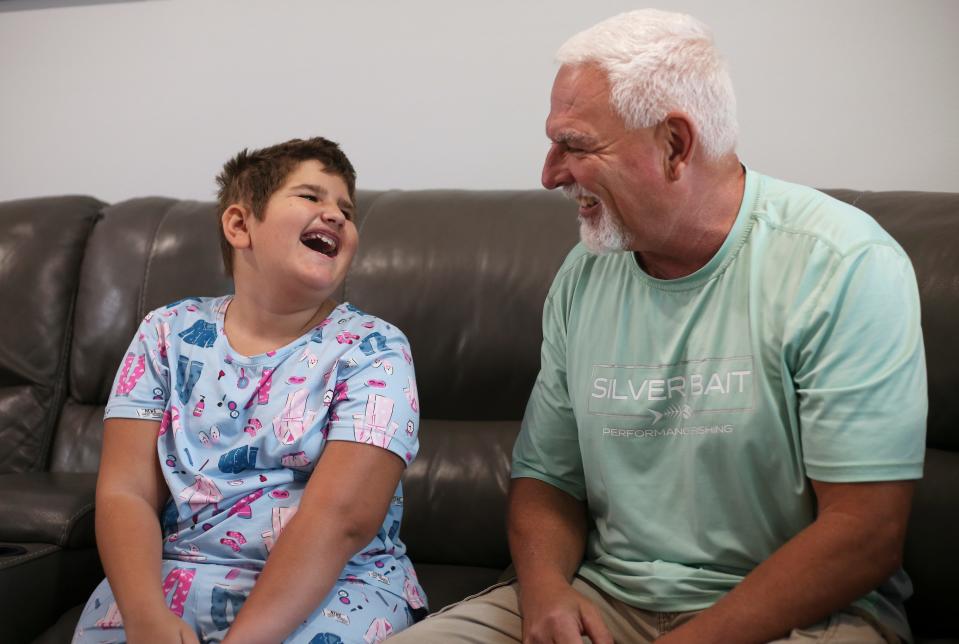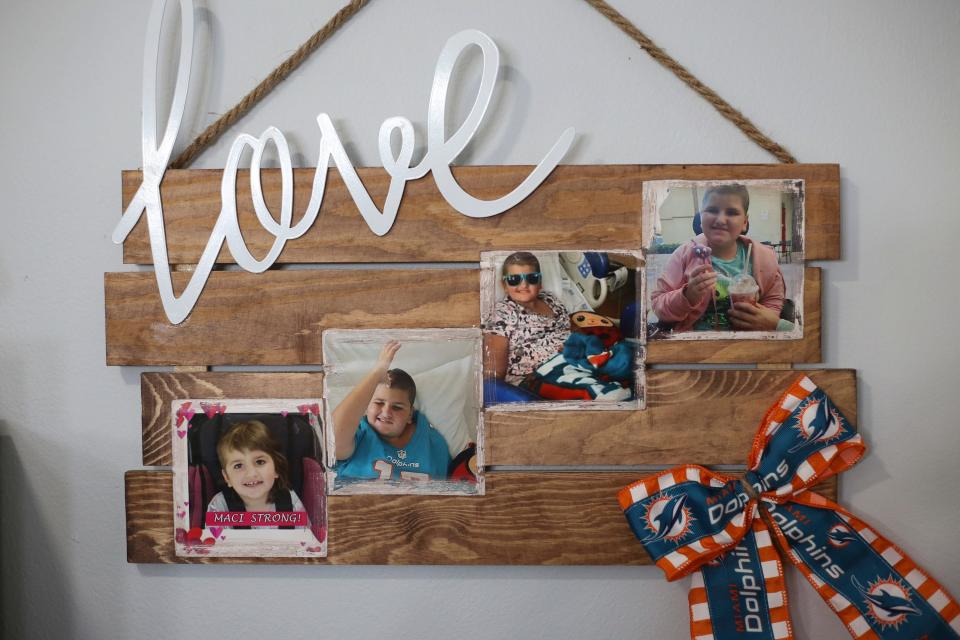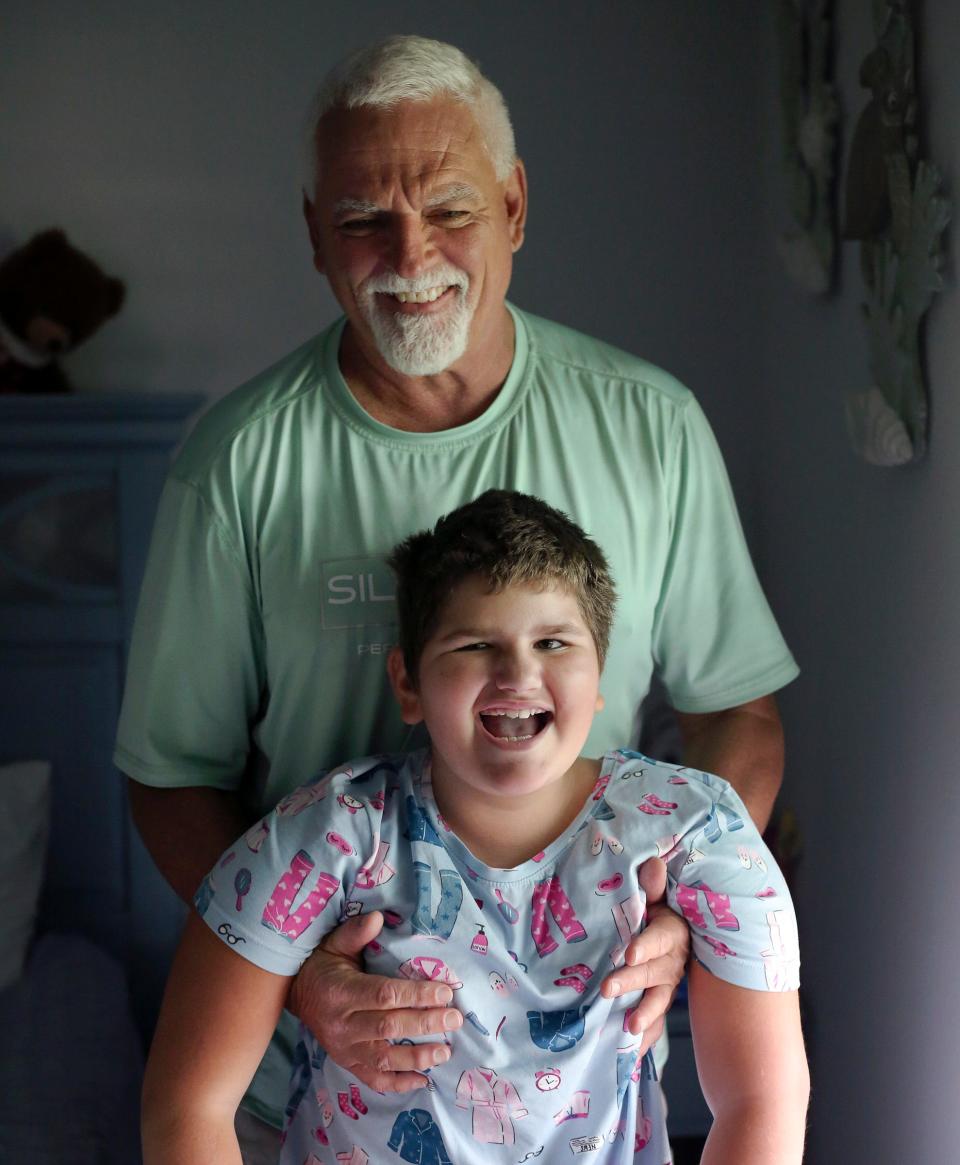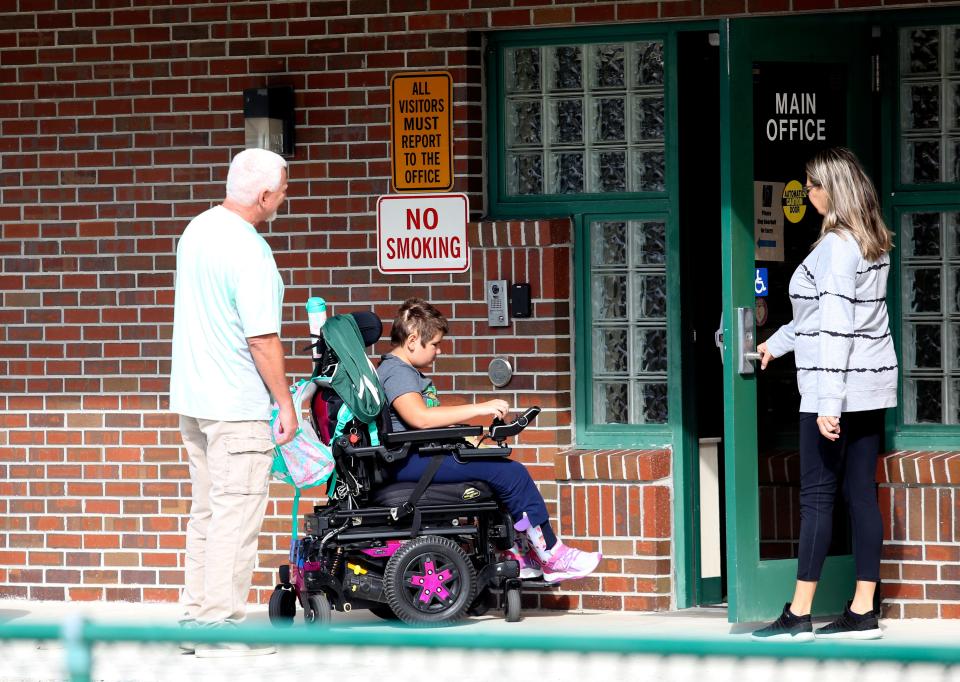Keeping up with Joneses at Thanksgiving: Maci back in school after brain surgery | Opinion
Five weeks after being released from a rehabilitation hospital following two brain surgeries, Maci Jones acted like a typical 7-year-old.
Having not seen me in more than a year, she smiled and pointed her right finger at my recently shaved head, repeating in that rhythmic way: “Larry has no hair; Larry has no hair.”
Maci also let her adoptive parents, Lisa and Darin Jones, know about the photographer she’d just met:
“Woo, woo … Kaila has a boyfriend; Kaila has a boyfriend.”
Maci’s enunciation was much better than I’d ever heard it.
I understood little of what Maci, then 3, said when I met her in November 2018, a little more than a year after she was nearly beaten to death by her birth mother’s boyfriend in Indian River County.
More: Retired sheriff's deputy, wife give 3-year-old abuse victim second chance at life
More: No winners: Man sentenced in nearly beating toddler Maci to death
Abused little girl gets guardian angels

I wrote about how Maci would spend her first holidays with the Joneses. The couple’s daughter had been childhood friends with Maci’s birth mother, who, in her 20s, had broken up with the father and had moved in with another man.
By mid-2021, that man, Stevie Wallace, then 30, was convicted of aggravated child abuse with serious harm for beating Maci, and sentenced to 30 years in prison.
Alone after the attack, Maci’s mom saw the Joneses as perfect to raise her little girl. She remembered them as great parents. And Darin Jones, now 59, was a retired sheriff’s captain who’d opened his own restaurant in downtown Vero Beach.
It wasn't until a month after the abuse, when Maci came out of a coma, that the Joneses saw her in a West Palm Beach hospital. It took only a few seconds for the couple to realize they had to help.
“All you had to do was look in that’s baby’s eyes,” Darin Jones told me in 2018. “She’s laying there and she’s so helpless. … I cried. How can you do that to a little girl?”
That began the legal journey to become adoptive parents. But the journey of raising a child whose brain was damaged during the attack is beyond what many of us can imagine.
Maci wasn't expected to live after Wallace beat her Sept. 22, 2017, while her mother was at work.
“(Maci) couldn’t do anything,” world-renowned physiatrist Craig Lichtblau told a jury about what he saw when he examined her at St. Mary’s Medical Center after the beating.
No speech. No movement on the left side of her body. Her only shot at life: a craniotomy, in which surgeons opened her skull to free blood crushing her brain, Lichtblau said.
After seeing Maci 54 times in the hospital, followed by 10 office visits through 2020, Lichtblau assessed her damaged brain and neurons.
“She will lack judgment, insight and sense of consequence forever,” Lichtblau said. “She won’t know right from wrong or whether someone is friend or foe. She will always need somebody to watch over her.”
Different kind of 'retirement' lifestyle
That’s "somebody" has been the Joneses, who take Maci several times a week to physical, occupational and speech therapy and to out-of-town physicians for checkups and surgeries.
Because of the brain damage, Maci has limited use of her left side — particularly her arm and leg. She cannot walk on her own. The Joneses, who lived in a two-story home, sold it and bought the one-story home his parents moved into in 1979. He retrofitted it to make it accessible. It has a pool the couple uses to exercise Maci, who maneuvers an electric wheelchair to get around outside the home.
For years, the Joneses traveled to Orlando, where Nemours Children's Hospital physicians helped treat Maci’s seizures caused by the trauma.
In early 2021, they lasted anywhere from a few seconds to 45 seconds when Maci heard something unexpected — like silverware falling, a plastic soda bottle crinkling or a dog barking, Darin said.
“Her body jerks and her lip goes in and out, and when she's done, she says what happened,” Darin told me.
The seizures got progressively worse, even after Maci began kindergarten in fall 2021 at Rosewood Magnet School. Her inability to sleep at night affected the rest of her life.
Maci went from one to four anti-seizure medications twice a day, her father said, until Nemours physicians referred her to a pediatric neurosurgeon in Miami.
Dr. John Ragheb, chief of pediatric neurosurgery at Jackson Memorial and Nicklaus Children’s hospitals in Miami since 1996, has seen suffering like Maci’s before. In Maci's case, he said, the damaged side of her brain was causing seizures.
He recommended a hemispherotomy, a highly complex surgery in which the damaged side of the brain is disconnected from the functioning side. Ragheb said his hospital, the top in the Southeast, does about five a year.
Brain surgeries tax mom, dad, too
The family arrived at the hospital 5 a.m. Sept. 12, before Maci went into the operating room. For nearly half a day, all her parents could do was cry, pace and wait.
“There’s not much you can do,” Darin said, noting they received regular updates from hospital staff. “You have to be prepared for a long surgery.”
Ragheb supervised the 11-hour hemispherotomy. The Joneses had to be prepared for when Maci woke up.
“We held her hands; we cried,” said Darin, who wrote about the surgery on his Facebook page. “She looked awful” when she woke up.
Then she started talking better, was alert and had more strength than expected.
“We thought everything was going to be OK,” Darin said. "We thought this was the way it was supposed to be. … But they don’t know everything about the brain.”
Apparently Maci had also been suffering from hydrocephalus, the pressure of too much cerebrospinal fluid pressing against the brain. The pressure can cause an array of problems, from behavioral and cognitive issues to vision, balance and incontinence challenges.
After the hemispherectomy, an external drain was placed in Maci’s head so excess fluid could be collected. Still, she suffered symptoms of hydrocephalus.
Pediatric neurosurgeon from Miami optimistic

“Every time we tried to feed Maci, she was throwing up,” Darin said.
So much cerebrospinal fluid came out over two weeks doctors installed an internal drain to send the fluid into an area near her stomach and bowels. The fluid is absorbed by her body.
“Lisa and I — we fell apart again because Maci would have another operation,” Darin said.
The drain remains about as open as it can get, with Maci continuing to have lots of fluid near her brain, Darin said. The hope is excess fluid will go down over time.
The good news, Ragheb said, is Maci has an 85% chance of avoiding further seizures, and hydrocephalus symptoms are gone.
"I think her parents can be optimistic now that Maci will be able to go to school and eventually function independently," Ragheb said.
After more than two weeks in Nicklaus, Maci was transferred to Jackson Memorial for three hours a day, six days a week, of rehabilitation. The Joneses were there with her 24/7.
It was a lot for Maci.
“I want to go home,” she told her parents toward the end of her stay, Darin said. “I can’t do this anymore. I just want to see my puppies.”
They returned home Oct. 12, and Maci returned to school.
Getting Maci ready for school isn’t easy.
Her father wakes her up gently.
“How’s lefty?” he asks her, before helping her stretch and exercise her damaged arm and leg.
Colored drink helps syringe full of medicine go down

She needs help getting dressed, which she does after dancing, while seated, to a song on Disney’s “The Descendants” video.
She’s not fond of the bitter-tasting, liquid epilepsy medicine she has to take twice daily. Darin coaxes her to take it by offering a Gatorade chaser.
Maci’s not excited about wearing all four braces she uses — for her legs, built into her shoes — and her left forearm.
But she’s excited to see her classmates and aide in school. Darin, getting behind her with his arms under her armpits, helps get her into her 400-pound wheelchair. She uses her right hand to guide it into the driveway and onto a lowered platform of a used GMC Yukon whose customized passenger doors open upward, like a Delorean.
“She loves (school),” Darin said, noting Rosewood has been good for her. “She loves that interaction with the kids.”

Life in school, with Dolphins fans
Since the surgery, though, Maci’s father has noticed she's had a tougher time reading. She's forgotten some of her sight words.
“It’s a lot of work for her,” Darin said. “She can get really frustrated. The words are there … She just tires easily.”
The Joneses must have a lot of energy.
“This is a tough life we’re living here, but she’s in the right place,” Darin Jones said. “It is harder on her than it is us.”
The Joneses are thankful to a large community that has supported Maci, spiritually, personally and financially.
Like Allison "Dolphreaky" Goodman, the Miami Dolphins' nominee for NFL Fan of the Year. A pharmacist in Southwest Florida, Goodman met Maci while tailgating outside a Dolphins game and learned about her story.
https://t.co/c2HJDrZKix
Many were touched by Maci’s story and asked how to help. With the permission of Maci’s family, I set up a GoFundMe to directly benefit her care and educational expenses. If there’s one thing I know about #DolphinsTwitter, it’s that we can change lives 💕— Dolphreaky (@dolphreaky) January 15, 2022
“I was moved to tears. I’d never heard of something so tragic, yet so beautiful at the same time,” Goodman told me in an email. “Lisa and Darin taking her in as their own despite her struggles is just beyond incredible. As a mom, and an adoptee myself, I was fully amazed by the story.”
Goodman, who started her own nonprofit to help people in need, began a GoFundMe page for Maci. Darin said proceeds would be used for future expenses. He has an account for her at MIDFLORIDA Credit Union in Vero Beach.
The family plans to have a quiet Thanksgiving watching football and celebrating what Lisa Jones said she is most thankful for.
“We’re just thankful we’ve got Maci,” she said.
Amen.
This column reflects the opinion of Laurence Reisman. Contact him via email at larry.reisman@tcpalm.com, phone at 772-978-2223, Facebook.com/larryreisman or Twitter @LaurenceReisman
This article originally appeared on Treasure Coast Newspapers: Brain surgery can't keep Maci. 7, from school, loving adoptive parents

